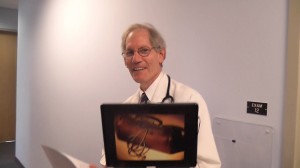By Katie Kerwin McCrimmon
WESTMINSTER Exam room No. 1 at Westminster Medical Clinic is a striking departure from the classic, sterile rooms in a typical doctors office.
The walls are pale lavender. Soft light from a lamp washes over a plush couch and easy chair.
Candles and a CD player sit on a bookshelf next to wellness and self-help books along with the bible of the American Psychiatric Association, the Diagnostic and Statistical Manual of Mental Disorders.
Yet, this oasis is a place within the walls of a busy primary care practice where doctors can lead a patient, giving them whats called a warm handoff. That means the patient goes straight from a traditional doctor into the hands of a behavioral health counselor. No stigma. No need for a referral or a trip to a different location. The doctor hopes that patients will get help right away with mental health issues that could be affecting their physical health profoundly.
The room is also a symbol of hope that a badly broken system finally can be fixed.
Dr. Scott Hammond, 58, is a family practitioner at Westminster Medical Clinic. He has been trying for nearly two of his three decades in primary care to blend behavioral health care with his medical practice. He and his colleagues even provided a free office to counselors. But, three times, these attempts failed.

Physician’s assistant, Sarah Goff, and health coach Beth Neuhalfen compare notes on a patient at Westminster Medical Clinic. Goff is amazed to hear that the patient has already cut his soda intake and working out several days a week.
Now Hammond and his co-workers at Westminster Medical Clinic have been identified as innovators who are receiving $150,000 and extensive technical support from a new program called Advancing Care Together (ACT). They will spend the next three years trying to prove that the disparate worlds of physical and mental health can finally be integrated and that patient health will improve dramatically while costs level off or go down.
Fifty percent of my patients have (mental health) problems. I cant treat them without having comprehensive care, Hammond said. Weve failed in the past. We co-located a mental health person right in our office. This time, we will get it right.
An impatient optimist
You could call Hammond an impatient optimist. Getting integrated medical and mental health care right is nothing short of critical. Experts often say that the U.S. health system is broken. Slip on Hammonds white coat for a moment and youll understand just how broken it is.
He had one patient who tried to commit suicide. She was released from the hospital and given a long list of mental health counselors for follow-up care.
After 119 attempts, she gave up. The calls were unanswered or unreturned. Some providers no longer were in practice. Other therapists refused to take new patients or couldnt provide an appointment for weeks. So, the woman called her most trusted health adviser, Dr. Hammond.
He worked the phones.
We got her in to see someone within 48 hours. I called six people and twisted arms. Thats the mental health system: barrier after barrier, Hammond said. Its a sham, a complete sham. Theres no effectiveness to the system at all and patients are suffering terribly.
Thats why I brought a therapist into our office. How desperate must you be to pay to bring them in? We have a connection to our patients. We have a different standard of personal responsibility, Hammond said. Our strength is our weakness. We will do whatever we can to take care of our patients even if it is at our sacrifice personally, professionally or financially.
Sometimes the circumstances are less dire than suicide, but just as deadly over the long run.

Dr. Scott Hammond carries a laptop with a photo of an old-fashioned doctor’s bag. Hammond has aggressively adopted the newest innovations in primary care. He’s hoping that a behavioral health counselor and health coach will help him provide better, less expensive care to patients.
Hammond had a patient in his 40s who was smart and successful in his job. Yet, his diabetes was completely out of control and would not adhere to either medical or lifestyle recommendations.
I worked with him and worked with him and couldnt find the button to push. It was incredibly frustrating for me not to be able to figure this out. He would voice agreement with me, but he wouldnt adhere to a treatment plan, Hammond said.
I offered to send him to a therapist suspecting a psychological barrier. He said he would go, but he didnt.
After five years of frustration, Hammond ultimately made a choice he didnt like. He decided he was not helping the man and suggested he see one of his partners instead.
I hardly ever discharge patients, but I wasnt helping him, he said. Its not pleasurable for a physician to be a failure when you know that you could help someone.
Hammond believes that control issues, not diabetes, were at the root of the mans health issues. He wonders if that patients glucose levels would have improved quickly had he had access to free or inexpensive therapy right in the office.
He needed to be in control. By denying his disease, he was in control, Hammond said. Clearly psychological issues were interfering with his care. We in primary care dont have the time or, at times, the skills to deal with the difficult problems that sometimes interfere with success.
How do you get the patient to be activated in taking care of problems? Thats not the primary role of the primary care physician anymore, Hammond said. Yes, Im trained in engaging patientsbut it really requires a team.
Health investment: coaches and counselors inspire change
Enter the health coach and the behavioral health counselor, two experts who earn far less than a doctor, but who may be more skilled in coping with mental health challenges or helping people change their behavior.
Desiree Sanchez is the behavioral health counselor who just started last week as Westminster began its ACT experiment. Shes a licensed clinical social worker and is already seeing patients whove gotten a warm handoff from their doctor. A health screening might indicate depression, anxiety or another mental health challenge. Or a lab result might show a disease thats out of control. In cases like these, Sanchez can give the patient quick coping tools or set up several appointments.
I bring them into a comfy area. You feel safe, more like youre at home, Sanchez said. The feeling that youre not in an exam room helps people let their guard down.
Another expert on Westminsters team is Beth Neuhalfen. Shes the integrated health coach and is also Westminsters medical home manager. The practice is one of 16 family and internal medicine practices along Colorados Front Range that are leading efforts to implement the newest innovations in primary care. The concept of a medical home is like primary care on steroids. A team of providers uses data and unconventional methods like group appointments and focus groups to put patients at the center of their care. The idea is that giving patients intensive primary care keeps them healthier and prevents exorbitantly expensive hospital visits.

Desiree Sanchez, the new behavioral health counselor at Westminster Medical Clinic, says goodbye to patient, Ariadne Williams. The family practice is experimenting with providing a counselor that any patient can see.
Integrating mental and physical health care fits right in with the medical home model.
Neuhalfens job as health coach is to partner with patients and inspire them to think of ways they can maximize their health.
Its about clarifying their mission, purpose and goals to help them achieve that outcome, giving them tools and inspiration to avoid a chronic disease or not letting a chronic disease take over their health, Neuhalfen says.
She holds sessions with patients and discusses nutrition, exercise and ways they can change their behavior to have positive relationships. Providers refer patients to the health coach when they are difficult to treat or arent getting better. The most stubborn chronic problems in nearly every doctors office today relate to chronic conditions like diabetes, obesity and cardiovascular health.
Passing through the hallway at Westminster Medical Clinic on Tuesday, Neuhalfen compared notes with physician assistant, Sarah Goff. Neuhalfen was celebrating a patients victories after just two visits.
Hes cut his Mountain Dew from two liters a day to one-half liter per day and is now going to the gym three or four times a week. He hadnt stepped foot in a gym for six years, Neuhalfen said.
Three failures, now hope
Fifteen years ago, when Dr. Hammond made his first attempt at mental health integration, two psychologists set up shop at Westmed.
We were so frustrated with the inability to access care for our patients that we offered them free room and board. The need was so great that we chose to do that, Hammond said.
That first arrangement failed due to a contract dispute.
It was a business model failure, Hammond said.
The next time, the doctors charged a psychologist from West Metro Mental Health $5 per day for a room. He didnt seem to engage with patients and soon left.
The third provider came in for another sweetheart deal on rent, but chose to reduce her practice to Saturdays only.
Hammond decided that even though he had resolved the barrier related to location, patients still wouldnt or couldnt pay for care.
There were two obvious barriers: financial and logistical.
Under ACT, the team at Westminster is using $36,000 per year from their grant to cover the expenses of the part-time therapist.
The new model requires no copay from the patients.
The ACT funds are paying for the behavioral health counselors time. She will be there three days a week. Instead of charging under a fee-for-service model, where the medical provider charges per visit, Westminster is contracting with a mental health provider called Community Reach to keep its patients well. Community Reach will get $36,000 per year. The therapist will see all the patients who need help. Under this model, providers want to do everything to get a patient well quickly. There is no incentive to continue seeing a patient if they no longer need care.
Neuhalfens health coaching visits can be reimbursed through health insurance plans. Once the initial three years of ACT have passed and there is no longer grant money to fund the behavioral health counselor, practice managers are banking on health coach reimbursements to fund the mental health care at Westminster.
Hammond and Neuhalfen are hoping for tangible results.
If you have a problem right now, its seamless. Lets go right now, Hammond said.
If a patient doesnt get better after six visits, the mental health counselor and doctor can still refer the patient for longer-term therapy.
We took a moral stance to do this because its the type of care we want to give, Hammond said. Previously, giving away the room wasnt sustainable. It isnt something you could spread.
Hammond said some patients respond quickly and easily to his treatment. For instance, one patient was an ex-military man. He compared his doctor to his general, took the orders and immediately lost 30 pounds. Others dont comply with treatment plans and may resist seeing a health coach.
They tell me, Im going to try harder. Give me one more chance, he said. They apologize and theyre humiliated, but theyre unable to make behavioral changes.
Usually a single session overcomes that reluctance. One man initially didnt want to see the coach. He brought his wife and both loved the visit so much that the wife was soon scheduling her own health coaching session.
Its a different relationship. I know that patients will tell me things knowing they wont do them. They want to please me. Its pervasive. With the coach, its more peer to peer, Hammond said. My patients are honest with me, but they dont want me to think poorly of them. Its like getting sent to the principals office. People come to the health coach prepared to talk about real issues.
About 10 years ago, Hammond had become so frustrated with the seemingly intractable problems in medicine that he nearly quit. Learning cutting-edge medical home practices reinvigorated him. And one of his daughters convinced him that one doctor does indeed have the power to change the system. Together they started a nonprofit called the Colorado Center for Primary Care Innovation.
Now, Hammond is hoping that the ACT program will give him more reason to stick with his calling as a healer.
Family physicians handle 53 percent of mental health care in this country. Im extremely excited. This is my back-to-the-future dream.
